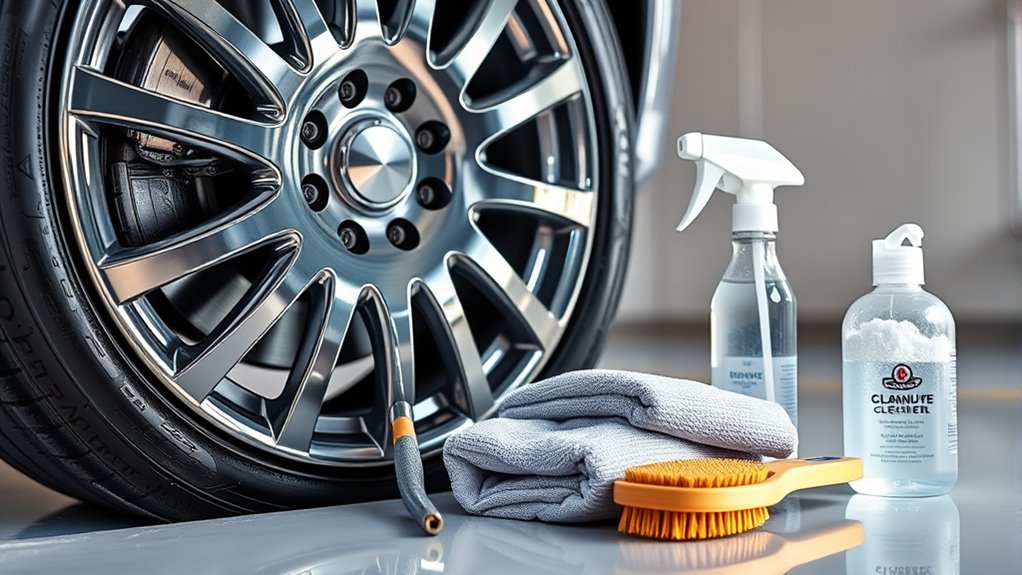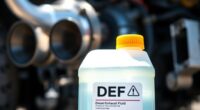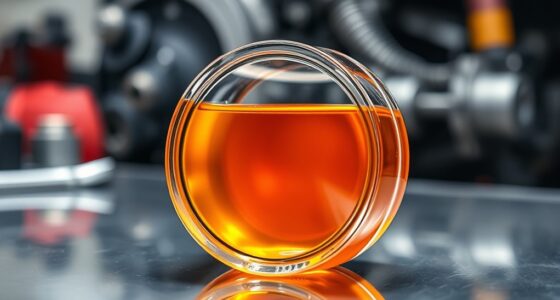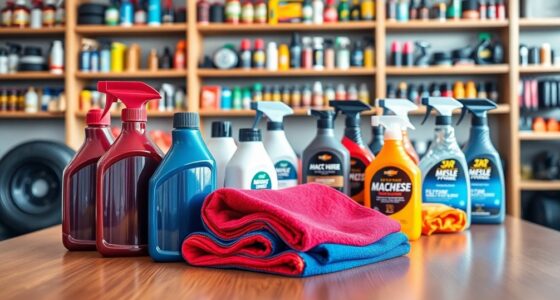To keep your wheels looking their best, choose from abrasive, chemical, or natural cleaners. Abrasive cleaners scrub away tough dirt but can scratch delicate finishes if used improperly. Chemical cleaners use acids or alkalis to quickly break down grime, but they require careful handling to avoid damage. Natural options with eco-friendly ingredients are gentler and safe for regular maintenance. Understanding each type’s safe use ensures you protect your wheels; discover more for ideal care.
Key Takeaways
- Use non-abrasive or mild chemical cleaners for painted or polished wheels to prevent scratches and damage.
- Choose natural or eco-friendly cleaners for regular maintenance, especially on sensitive or electric vehicle components.
- Follow manufacturer instructions carefully and use soft brushes or microfiber cloths to avoid surface scratches.
- Rinse thoroughly after cleaning to remove residue and prevent long-term surface damage.
- Avoid harsh chemicals or aggressive scrubbing on alloy or chrome wheels to maintain their finish and integrity.

Choosing the right wheel cleaner is essential for maintaining your vehicle’s appearance and preventing damage. When selecting a cleaner, you’ll encounter options that differ in their abrasiveness and chemical composition. Abrasive cleaners contain tiny particles or gritty agents designed to scrub off stubborn grime, brake dust, and road dirt. While they can be effective at removing tough stains, they also pose a risk of scratching your wheels if used improperly. Non-abrasive cleaners, on the other hand, rely on chemical reactions to break down dirt and grease without scratching the surface. For everyday cleaning, non-abrasive formulas tend to be safer and less likely to cause damage, especially on delicate finishes or polished wheels.
You’ll also need to decide between chemical and natural wheel cleaners. Chemical cleaners often contain acids or alkaline agents that rapidly dissolve brake dust and grime but require careful handling because they can be harsh on your wheels and the environment. Some of these chemicals might be too aggressive for certain wheel finishes, leading to discoloration or surface damage if not used correctly. Natural cleaners, by contrast, use eco-friendly ingredients such as citrus extracts, vinegar, or baking soda. They’re gentler on your wheels and safer for the environment, making them a good choice for regular maintenance or if you’re concerned about harsh chemicals. However, natural cleaners may require more effort or multiple applications to achieve the same level of cleanliness as chemical options, especially on heavily soiled wheels.
Additionally, understanding electric power and how it relates to your vehicle can help you choose cleaners that are safer for electric or hybrid cars, which often have sensitive components. It’s important to think about the type of wheels you have before choosing a cleaner. For example, painted or polished wheels benefit from non-abrasive, natural or mild chemical cleaners to avoid scratching or dulling the finish. Alloy or chrome wheels, which are more resilient, can withstand slightly more aggressive cleaning methods, but that doesn’t mean you should neglect gentler options. Always check the product label to see if it’s suitable for your specific wheel type. When applying any cleaner, follow the manufacturer’s instructions carefully, and avoid letting harsh chemicals sit on the surface for too long. Use a soft brush or microfiber cloth to scrub gently, especially if you’re using abrasive or chemical cleaners. Rinsing thoroughly afterward ensures no residue remains, preventing long-term damage.
Frequently Asked Questions
Can Wheel Cleaners Damage Brake Components?
Yes, wheel cleaners can damage brake components if they contain harsh chemicals that cause chemical reactions with brake parts. These reactions can lead to brake damage, corroding or weakening the components. To avoid this, always choose wheel cleaners specifically formulated as safe for brake systems and follow the manufacturer’s instructions. Proper application and rinsing help prevent any adverse chemical reactions, ensuring your brakes stay in good condition.
Are All Wheel Cleaners Environmentally Friendly?
Did you know that over 60% of car owners prefer eco-friendly products? Not all wheel cleaners are environmentally friendly; many contain harsh chemicals that harm ecosystems. However, eco-friendly formulations use biodegradable ingredients that break down naturally, reducing pollution. When choosing a wheel cleaner, look for labels indicating biodegradable ingredients, ensuring safe use for the environment while maintaining peak cleaning power. This way, you protect your car and the planet simultaneously.
How Often Should I Clean My Wheels?
You should clean your wheels every 1 to 4 weeks, depending on driving conditions and brake dust buildup. Proper wheel maintenance involves choosing the right cleaner that suits your wheel type and cleaning frequency. Regular cleaning prevents corrosion and keeps your wheels looking their best. If you notice dirt, grime, or brake dust, it’s time for a wash. Consistent cleaning helps maintain your wheels’ appearance and longevity.
Can I Use Household Cleaners on Wheels?
You shouldn’t use household cleaners on your wheels because they often contain harsh chemicals that can damage the finish. Instead, opt for DIY solutions like a mix of soap and water or commercial products specifically designed for wheels. These cleaners are formulated to remove dirt and brake dust safely without harming your wheel’s protective coating. Always follow the manufacturer’s instructions to guarantee proper and safe use.
What Precautions Should I Take During Application?
When applying wheel cleaner, you should wear protective gear like gloves and goggles to prevent skin and eye irritation. Make sure you apply the cleaner during cool, shaded conditions to avoid rapid evaporation or damage. Follow the instructions carefully, and don’t let the cleaner sit too long. Rinse thoroughly afterward. These precautions help keep you safe and ensure effective cleaning without damaging your wheels.
Conclusion
Now that you know the different wheel cleaner types and how to use them safely, you’re ready to tackle grime like a modern-day knight. Remember, choosing the right cleaner and following instructions prevents damage and keeps your wheels shining like the polished armor of a bygone era. So, don your gloves, wield your chosen cleaner wisely, and give your wheels the royal treatment they deserve—like a noble steed ready for the grand parade.









